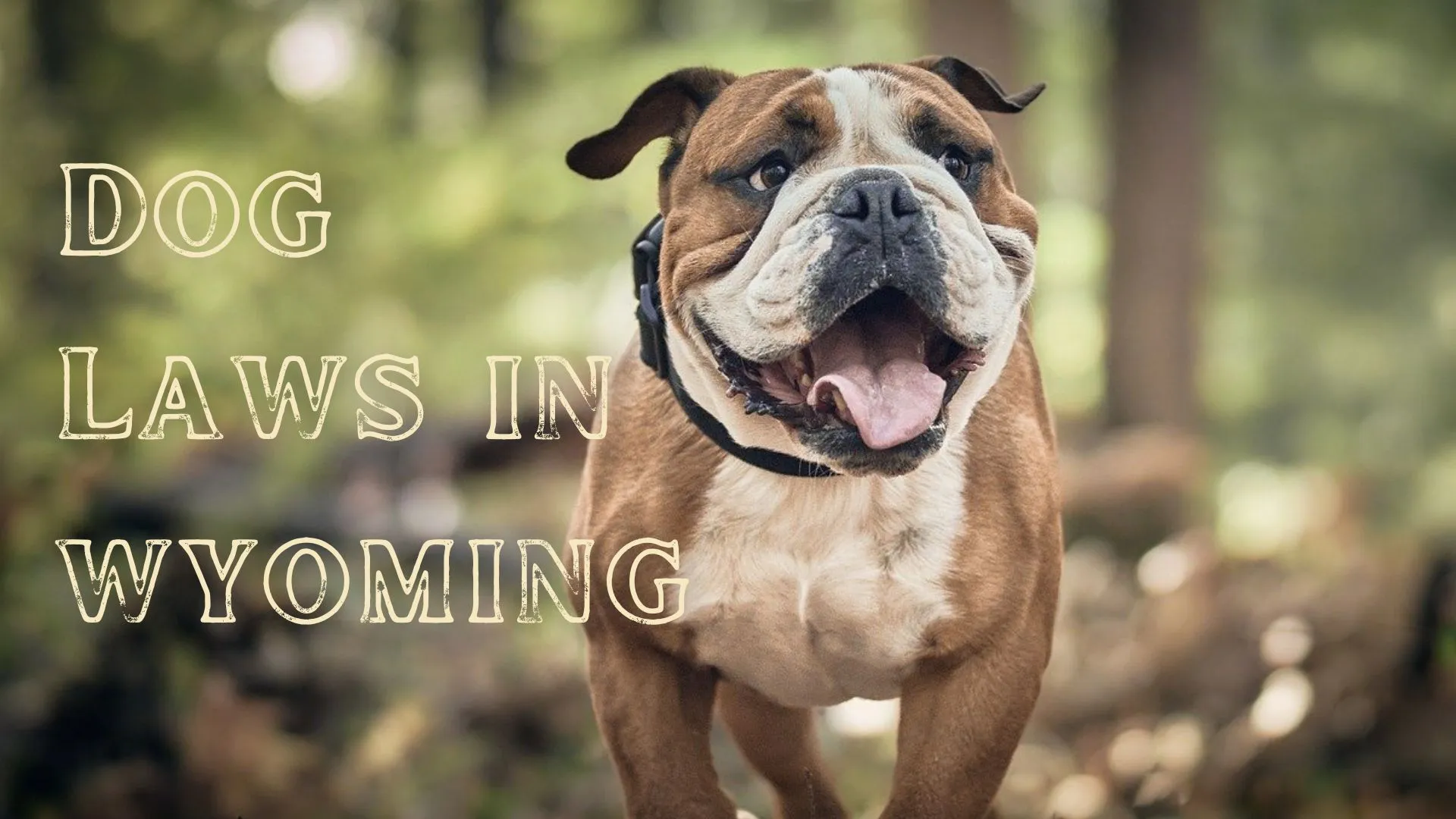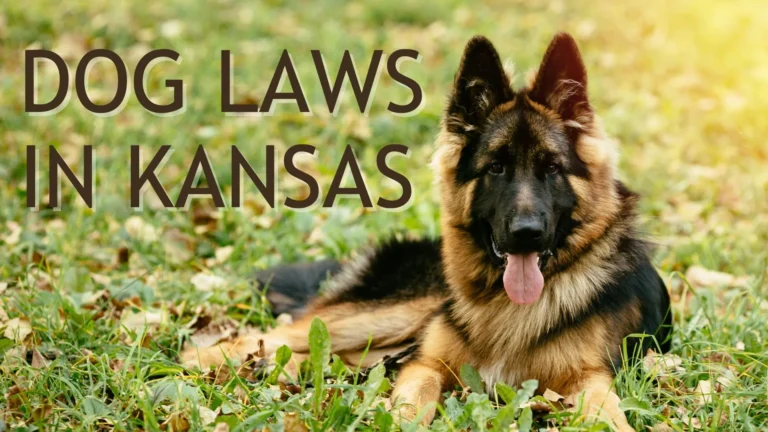Dog Laws in Wyoming
As a dog owner in the United States, with over 85 million canine companions gracing our homes, understanding dog laws is crucial. These laws aren’t just about avoiding fines; they ensure the safety, well-being, and responsible ownership of our furry friends. Delving into dog laws in Wyoming might seem overwhelming, but fear not!
This guide will break down the legalese into clear and actionable steps. We’ll explore everything from licensing and vaccination requirements to regulations on public spaces, entertainment, and even working dogs. By understanding these various legal areas, you can build a fulfilling and legally compliant life with your canine companion in Wyoming.
Table of Contents
Dog Bite Laws in Wyoming
For dog owners and dog lovers in Wyoming, navigating the legal landscape surrounding dog bites can be confusing.

Wyoming’s “One-Bite” Rule
Unlike some states with stricter dog bite statutes, Wyoming adheres to the “one-bite” rule. This means a dog owner is generally not liable for their dog’s first bite unless they knew or should have known their dog had a propensity to bite.
Key Considerations for Dog Bite Liability
Here’s a breakdown of factors influencing dog bite liability under Wyoming’s “one-bite” rule:
- Prior Knowledge of Aggressive Behavior: The crux of the matter lies in whether the dog owner knew or should have known their dog was likely to bite. This could include past incidents of aggression, growling, snapping, or chasing behavior.
- Breed Specificity: While breed isn’t the sole determining factor, courts might consider breeds historically associated with aggression when evaluating prior knowledge of potential biting behavior.
- Provocation by the Victim: If the victim provoked the dog’s attack by trespassing, teasing, or threatening the animal, liability for the bite might be reduced or even eliminated.
- Location of the Bite: The location of the bite might influence liability. If the bite occurred on private property where the victim was lawfully present, the owner might be held liable. However, trespassing can impact the victim’s case.
Exceptions to the “One-Bite” Rule
While the “one-bite” rule is the general principle, there are some exceptions where dog owners might be held liable even without prior knowledge of biting tendencies:
- Negligence: If the dog owner’s negligence contributed to the bite, such as leaving a gate unlocked or failing to properly restrain a known aggressive dog, they might be liable.
- Leash Law Violations: If a dog bites someone while not leashed as required by local ordinances, the owner might be held liable regardless of prior biting behavior.
- Dangerous Dog Statutes: Some municipalities in Wyoming might have “dangerous dog” statutes with stricter liability for owners of dogs deemed dangerous based on past behavior.
What to Do After a Dog Bite
If you’re bitten by a dog in Wyoming, here are crucial steps to take:
- Seek Medical Attention: Your primary concern should be seeking medical attention for your injuries. Document the bite with photos and get a doctor’s report detailing the extent of the injuries.
- Report the Bite: Report the bite to animal control immediately. This helps establish a record of the incident and allows animal control to investigate the dog and owner.
- Gather Information: If possible, try to gather information about the dog, its owner, and any witnesses to the bite. This information will be crucial if you decide to pursue legal action.
- Consult an Attorney: Dog bite injuries can be complex, and legal advice from an attorney experienced in Wyoming dog bite laws is highly recommended.
Resources for Dog Bite Victims
Here are some resources for dog bite victims in Wyoming:
- Wyoming State Bar Association: The WSBA website can help you find an attorney experienced in dog bite cases.
- Animal Control: Contact your local animal control agency to report the bite and obtain information about the dog and owner.
- Public Health Department: The local public health department might be able to provide information on rabies vaccinations and post-exposure protocols.
Preventing Dog Bites: A Shared Responsibility
Dog bites are preventable. Here are some ways dog owners and the community can work together to minimize the risk:
- Responsible Dog Ownership: Proper training, socialization, and responsible ownership practices can significantly reduce the risk of dog bites.
- Obeying Leash Laws: Always leash your dog in public spaces as mandated by local ordinances. This protects both your dog and others.
- Respecting Dog Body Language: Learn to recognize canine body language and respect signs of fear or anxiety in dogs to avoid provoking an attack.
- Teaching Children Dog Safety: Educate children on how to interact safely with dogs and avoid situations that could lead to a bite.
Dog Barking and Noise Laws in Wyoming
For Wyoming residents, the joyful companionship of a canine companion comes with certain responsibilities. One such responsibility is ensuring your dog’s barking doesn’t become a nuisance to neighbors.

Dog Barking and Noise Laws
Wyoming doesn’t have a single, statewide law addressing dog barking. Instead, regulations are established at the municipal level:
- Municipal Ordinances: Most cities and towns in Wyoming have ordinances addressing noise disturbances, including excessive dog barking. These ordinances often establish decibel limits or define what constitutes unreasonable or disruptive noise.
- County Regulations: Some counties in Wyoming might have additional noise ordinances encompassing animal noise, including dog barking.
Key Considerations for Dog Barking
While specific decibel limits or durations might vary by municipality, here are some general considerations:
- Reasonableness: Courts often consider the “reasonableness” of the noise when determining a violation. Factors like duration, frequency, time of day, and neighborhood characteristics are evaluated.
- Justification for Barking: Barking triggered by external stimuli like strangers approaching the property, loud noises, or other animals might be considered reasonable. Constant, unprovoked barking is less likely to be tolerated.
- Chronic Nuisance: If your dog’s barking is a chronic nuisance, you might face warnings, fines, or even court orders mandating steps to address the problem.
Finding Solutions for Excessive Dog Barking
Addressing excessive barking benefits both you and your neighbors. Here are some tips:
- Identify the Cause: Understanding why your dog barks excessively is crucial. Common triggers include separation anxiety, boredom, territoriality, or seeking attention.
- Positive Reinforcement Training: Employ positive reinforcement training methods to teach your dog alternative behaviors like quiet commands or redirection with toys.
- Environmental Enrichment: Provide your dog with plenty of mental and physical stimulation to reduce boredom-induced barking. This can include interactive toys, puzzle feeders, and regular walks.
- Desensitization and Counterconditioning: For dogs barking at specific triggers, desensitization and counterconditioning techniques can help them develop a more positive association. Consult a professional trainer for guidance.
Resources
Here are some resources to help you address excessive dog barking:
- Association of Professional Dog Trainers (APDT): The APDT website offers resources on finding certified dog trainers in Wyoming who can assist with barking issues.
- Local Animal Shelters and Rescue Organizations: Many shelters and rescues offer training classes or behavior consultations to address barking problems.
- Veterinarian: Consult your veterinarian to rule out any medical conditions that might be contributing to your dog’s barking.
Legal Considerations for Noise Complaints
If you’re experiencing excessive dog barking from a neighbor’s dog, here are some steps to take:
- Document the Issue: Keep a log documenting the frequency, duration, and time of day of the barking. Consider recording video evidence if possible.
- Talk to Your Neighbor: Approach your neighbor politely and respectfully, explaining the issue and potential solutions. Open communication can often resolve the problem.
- Contact Animal Control: If communication doesn’t work, contact your local animal control agency to file a noise complaint. They will investigate the situation and take appropriate action.
Preventing Barking Issues
The best way to manage dog barking is to be proactive:
- Proper Socialization: Socialize your dog from a young age to ensure they are comfortable with various people, animals, and situations, reducing unnecessary barking.
- Positive Reinforcement Training: Enroll your dog in training classes using positive reinforcement methods to teach them desired behaviors like quiet commands and appropriate responses to triggers.
- Addressing Boredom: Provide your dog with plenty of exercise and mental stimulation to prevent boredom, a common cause of excessive barking.
- Desensitization Techniques: If your dog barks at specific triggers, employ desensitization techniques to help them develop a calmer response.
Dog Poop Disposal Laws in Wyoming
For dog owners in Wyoming, enjoying the state’s majestic landscapes with your canine companion comes with a crucial responsibility: cleaning up after your dog.

Dog Poop Disposal Laws
While there isn’t a single, state-wide law mandating dog waste disposal in Wyoming, most regulations are established at the municipal level:
- Municipal Ordinances: Most cities and towns in Wyoming have ordinances requiring dog owners to pick up and dispose of their dog’s waste properly. These ordinances often outline specific requirements, like carrying waste disposal bags and disposing of waste in designated receptacles.
- County Regulations: Some counties in Wyoming might have additional regulations regarding animal waste disposal, potentially expanding on municipal ordinances or applying to unincorporated areas.
Key Considerations for Dog Poop Disposal
Here are some key considerations regarding dog poop disposal in Wyoming, even if you don’t reside in a municipality with a specific ordinance:
- Public Health and Safety: Dog waste can harbor harmful bacteria and parasites that pose health risks to humans and other animals. Responsible disposal minimizes these risks.
- Environmental Impact: Left unattended, dog waste can pollute waterways and contribute to nutrient overload in ecosystems. Proper disposal protects Wyoming’s stunning natural environment.
- Social Responsibility: Scooping your dog’s waste is a sign of responsible pet ownership and respect for fellow dog owners, park users, and the community overall.
Dog Poop Disposal Regulations in Wyoming Municipalities
While specific details might vary, here are some common elements found in dog poop disposal ordinances across Wyoming municipalities:
- Carrying Waste Disposal Bags: Most ordinances require dog owners to carry appropriate waste disposal bags whenever their dog is outside on public or private property (excluding their own fenced yard).
- Proper Disposal: Waste must be disposed of in designated receptacles, typically trash cans specifically marked for pet waste. In some cases, burying waste in a shallow hole might be allowed, but double-check local regulations.
- Fines for Non-Compliance: Failing to pick up and dispose of your dog’s waste could result in fines or citations.
Finding Dog Waste Disposal Options
Here’s how to find dog waste disposal options when enjoying Wyoming’s outdoors:
- Parks and Trails: Most parks and trails in Wyoming have designated dog waste disposal stations with trash receptacles specifically for pet waste.
- Public Spaces: Look for designated dog waste disposal stations in public spaces like rest areas, parking lots, and sidewalks.
- Bring Your Own Bags: Always carry extra waste disposal bags, as designated stations might not always be readily available.
Responsible Dog Poop Disposal Practices
Being a responsible dog owner goes beyond just following the law. Here are some additional practices to consider:
- Double Bagging: Double bagging dog waste adds an extra layer of security and reduces potential odors.
- Tying Bags Securely: Tie waste disposal bags securely to prevent them from breaking open or being scattered by wind.
- Educating Others: Lead by example and educate other dog owners about the importance of responsible dog poop disposal.
Benefits of Responsible Dog Poop Disposal
Responsible dog poop disposal offers numerous benefits:
- Protects Public Health: Reduces the risk of spreading harmful bacteria and parasites.
- Safeguards the Environment: Minimizes water pollution and protects ecosystems.
- Maintains a Clean and Enjoyable Environment: Ensures parks, trails, and public spaces remain clean and pleasant for everyone.
- Promotes Responsible Pet Ownership: Sets a positive example for other dog owners and fosters a sense of community.
Dog Licensing Laws in Wyoming
Owning a dog in Wyoming brings endless joy and companionship. However, responsible dog ownership also involves complying with legal requirements, including dog licensing.
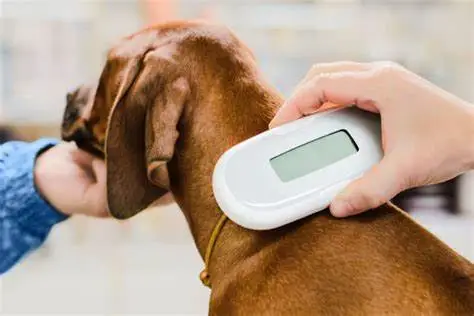
Understanding Dog Licensing Laws
Wyoming operates under a decentralized dog licensing system. Here’s a breakdown of the key aspects:
- Statewide Mandate: There’s no mandatory statewide dog licensing requirement in Wyoming.
- Municipal and County Regulations: Individual municipalities and counties have the authority to enact their own dog licensing ordinances. These ordinances often mandate dog licensing within their jurisdictions.
Why License Your Dog in Wyoming?
While not always mandatory, licensing your dog offers numerous benefits for both you and the community:
- Identification and Recovery: A dog license serves as an official identification tag, increasing the chances of your dog being returned if lost.
- Vaccination Verification: Licensing often requires proof of rabies vaccination, ensuring your dog’s health and public safety.
- Community Dog Programs: Licensing fees can contribute to funding essential dog programs like animal control services, rabies vaccination clinics, and dog park maintenance.
- Responsible Pet Ownership: Licensing signifies your commitment to responsible pet ownership and adherence to local regulations.
Dog Licensing Requirements in Your Area
Since dog licensing is managed at the local level, here’s how to determine if your area requires it and how to obtain a license:
- Contact Your Local Animal Control Agency: The most reliable source for information on dog licensing requirements and procedures is your local animal control agency. They can provide details on fees, renewal processes, and any necessary documentation.
- Check Municipal or County Websites: Many municipalities and counties have websites outlining their dog licensing ordinances, including fees, application forms, and licensing locations.
Typical Dog Licensing Procedures
While specific details might vary, here’s a general overview of the dog licensing process in municipalities with dog licensing ordinances:
- Eligibility: Licensing requirements typically apply to dogs four months of age or older.
- Documentation: Proof of rabies vaccination and potentially spaying/neutering certificates might be required for licensing.
- Fees: Licensing fees can vary depending on the municipality and whether your dog is spayed/neutered. Renewal fees might also apply.
- Licensing Location: You can usually obtain a dog license at your local animal control office, town hall, or designated veterinary clinics.
Benefits of Responsible Dog Licensing
Licensing your dog offers a multitude of advantages:
- Peace of Mind: Knowing your dog is licensed increases the chances of a safe return if they get lost.
- Community Investment: Licensing fees contribute to vital dog programs benefiting everyone.
- Compliance with Local Laws: Licensing ensures you’re adhering to local regulations and avoiding potential fines.
- Responsible Pet Ownership: Licensing demonstrates your commitment to responsible dog ownership.
What Happens if My Dog Isn’t Licensed?
If your dog is unvaccinated or unlicensed in an area with mandatory dog licensing, you might face consequences:
- Fines: Failure to license your dog can result in fines imposed by your local animal control agency.
- Impoundment: Unlicensed dogs might be impounded by animal control, incurring additional fees for retrieval.
- Potential for Euthanasia: In extreme cases, unclaimed, unlicensed dogs might face euthanasia.
Additional Considerations
Beyond licensing, responsible dog ownership encompasses several key aspects:
- Vaccinations: Maintain your dog’s vaccinations, including rabies, to protect their health and public safety.
- Microchipping: Consider microchipping your dog for an additional layer of identification and recovery potential.
- Training and Socialization: Invest in training your dog for good behavior and socialization to foster a well-adjusted canine companion.
- Preventative Care: Regular veterinary checkups ensure your dog’s health and well-being.
Dog Leash Laws in Wyoming
Wyoming boasts breathtaking landscapes, perfect for exploring with your canine companion. However, ensuring a safe and enjoyable experience for everyone requires understanding dog leash laws.

Dog Leash Laws
Wyoming doesn’t have a single, state-wide leash law. Leash regulations are primarily established at the municipal level:
- Municipal Ordinances: Most cities and towns in Wyoming have ordinances mandating leashes for dogs in public spaces. These ordinances define leash lengths, designated off-leash areas, and potential consequences for non-compliance.
- County Regulations: Some counties in Wyoming might have additional leash regulations, potentially expanding on municipal ordinances or applying to unincorporated areas.
Dog Leash Laws in Wyoming Municipalities
Even though specifics may vary, here are some common elements found in dog leash ordinances across Wyoming municipalities:
- Leash Requirements: Dogs in public spaces, like parks, sidewalks, and trails, must be on a leash of a specific length, often ranging from six to ten feet.
- Designated Off-Leash Areas: Many municipalities have designated off-leash dog parks where dogs can play freely under owner supervision.
- Voice and Sight Control: Some ordinances might allow for voice and sight control in specific areas instead of a leash, requiring owners to maintain control over their dog without a physical leash.
- Exceptions: Service animals trained to assist people with disabilities are generally exempt from leash laws.
Finding Information on Dog Leash Laws
Since leash regulations are managed locally, here’s how to determine the specific requirements in your area:
- Contact Your Local Animal Control Agency: The most reliable source for information on dog leash laws is your local animal control agency. They can provide details on leash lengths, designated off-leash areas, and any specific regulations for your municipality or county.
- Check Municipal or County Websites: Many municipalities and counties have websites outlining their leash laws, including designated off-leash parks and potential fines for non-compliance.
Benefits of Responsible Leash Use
Responsible leash use offers numerous benefits for both dogs and the community:
- Safety for Dogs: Leashes prevent dogs from running into traffic, encountering aggressive animals, or getting lost.
- Safety for Others: Leashes minimize the risk of dog bites or disruptions to pedestrians and other park users.
- Increased Control: Leashes enable owners to maintain control over their dogs, ensuring good behavior and responsible interaction with others.
- Peaceful Coexistence: Responsible leash use fosters a more peaceful and enjoyable environment for everyone using public spaces.
Responsible Dog Walking Practices
Going beyond just adhering to leash laws, here are some additional practices for responsible dog walking:
- Choose Appropriate Leash Length: Select a leash length that allows for control while providing your dog some freedom to explore.
- Use a Sturdy Leash and Collar: Ensure your leash and collar are strong enough to restrain your dog securely.
- Maintain Control: Always maintain control over your dog, keeping the leash slack but not allowing them to pull or lunge.
- Clean Up After Your Dog: Carry waste disposal bags and dispose of your dog’s waste properly to maintain a clean environment.
- Be Respectful of Others: Be mindful of other park users and maintain a safe distance, especially with children or people with anxieties around dogs.
Finding Designated Off-Leash Dog Parks
Looking for a space where your dog can run free? Here are some ways to find designated off-leash dog parks in Wyoming:
- Municipal Websites: Many municipalities list their off-leash dog parks on their websites.
- Local Apps: Mobile apps like “BringFido” or “Sniffspot” can help you locate dog parks in your area.
- Online Directories: Websites like the National Recreation and Park Association provide searchable directories of dog parks.
Dangerous Dog Laws in Wyoming
Wyoming, with its vast landscapes and open spaces, seems like a natural paradise for dog owners. However, ensuring a safe environment for everyone requires understanding the legal framework surrounding dangerous dogs. Unlike some states with more defined regulations, Wyoming’s approach to dangerous dogs is nuanced and relies heavily on local ordinances.

Dangerous Dog Laws
Wyoming doesn’t have a single, state-wide statute specifically defining dangerous dogs or outlining procedures for handling them. The legal landscape is primarily shaped by:
- Municipal Ordinances: Many cities and towns in Wyoming have ordinances addressing dangerous dogs. These ordinances often establish criteria for designating a dog as “dangerous” and outline potential consequences for owners of such dogs.
- County Regulations: Some counties in Wyoming might have additional regulations pertaining to dangerous dogs, potentially expanding on or supplementing municipal ordinances.
- Case Law: Past court cases in Wyoming can influence how judges interpret local ordinances and define dangerous dogs based on specific situations.
Key Considerations for Dangerous Dog Designations
Since there’s no single state-wide definition, here are some general factors municipalities and courts might consider when designating a dog as dangerous:
- History of Aggression: A documented history of biting, attacking, or threatening humans or other animals is a significant factor.
- Severity of Bites: The severity of any bites inflicted by the dog can play a crucial role in the designation.
- Provocation: If the dog was provoked by aggressive behavior from a person or animal, it might be considered less likely to be deemed dangerous.
- Breed Specificity: While breed isn’t the sole determining factor, courts might consider breeds historically associated with aggression when evaluating potential dangerousness.
Potential Consequences for Owners of Dangerous Dogs
If your dog is designated as dangerous by your municipality or through a court ruling, you might face some of the following consequences:
- Muzzle Requirements: Your dog might be required to wear a muzzle in public spaces.
- Leash Restrictions: Stricter leash laws might be imposed, requiring shorter leashes or muzzles in addition to leashes.
- Confinement Requirements: Your dog might be required to be confined to a secure enclosure or specific area within your property.
- Liability Insurance: You might be mandated to carry liability insurance specifically for dog bites.
- Fines: Fines can be imposed for non-compliance with dangerous dog ordinances.
- Potential Euthanasia: In extreme cases involving severe attacks or repeated violations, euthanasia might be considered by the court.
Importance of Responsible Pet Ownership and Training
The best way to avoid dangerous dog designations is through responsible pet ownership and proper training:
- Socialization: Socialize your dog from a young age to ensure they are comfortable with various people, animals, and situations, reducing potential triggers for aggression.
- Positive Reinforcement Training: Enroll your dog in positive reinforcement training classes to teach them desired behaviors and control impulses.
- Addressing Behavioral Issues: If your dog exhibits aggressive tendencies, seek professional help from a certified animal behaviorist to address the root cause and develop a behavior modification plan.
- Sterilization: Spaying or neutering your dog can reduce hormonal influences that might contribute to aggression in some cases.
What to Do if Your Dog is Deemed Dangerous
If your dog is designated as dangerous by your local authorities, here are some steps you can take:
- Consult an Attorney: An attorney experienced in animal law can advise you on your legal options and potential appeals processes.
- Work with a Certified Animal Behaviorist: Develop a comprehensive behavior modification plan with a certified professional to address your dog’s aggression and potentially challenge the designation.
- Comply with Regulations: While pursuing an appeal, ensure you comply with all mandated restrictions for dangerous dogs to avoid further penalties.
Resources for Responsible Dog Ownership
Here are some resources to help you be a responsible dog owner and potentially address issues with your dog’s behavior:
- Association of Professional Dog Trainers (APDT): The APDT website offers resources on finding certified dog trainers in Wyoming to assist with behavior modification.
- Local Animal Shelters and Rescue Organizations: Many shelters and rescues offer training classes or behavior consultations to address canine aggression.
- Veterinarian: Consult your veterinarian to rule out any medical conditions that might be contributing to your dog’s behavior.
Dog Health and Welfare Laws in Wyoming
Wyoming, known for its stunning landscapes, is a haven for outdoor enthusiasts and their canine companions. Responsible dog ownership, however, goes beyond enjoying adventures together. It also involves ensuring your dog’s health and well-being through proper care and adherence to relevant laws.

Dog Health and Welfare Laws
Unlike some states with more codified regulations, Wyoming’s approach to dog health and welfare is spread across various legal sources:
- Wyoming Statutes: Certain Wyoming statutes address specific aspects of animal welfare, including some provisions relevant to dogs.
- Municipal Ordinances: Many cities and towns in Wyoming have ordinances addressing animal cruelty and neglect, often encompassing dog health and welfare concerns.
- County Regulations: Some counties in Wyoming might have additional regulations pertaining to animal welfare, potentially expanding on state statutes or municipal ordinances.
Key Provisions in Wyoming Statutes
While there’s no single statute solely focused on dog health and welfare, here are some relevant provisions from Wyoming Statutes:
- Cruelty to Animals (W.S. 6-3-1002): This statute prohibits intentionally or knowingly injuring, neglecting, or abandoning animals. It outlines specific actions that constitute cruelty, including failing to provide adequate food, water, shelter, or veterinary care.
- Disposal of Dead Animals (W.S. 35-11-110): This statute outlines proper disposal methods for deceased animals, ensuring responsible pet owners don’t contribute to public health hazards.
Focus on Municipal Ordinances
Since Wyoming lacks a comprehensive state-wide law, municipal ordinances are the primary source for detailed dog health and welfare regulations. Here are some common areas addressed by these ordinances:
- Tethering Restrictions: Many municipalities restrict tethering dogs for extended periods or in harsh weather conditions.
- Proper Shelter Requirements: Ordinances might mandate providing adequate shelter from Wyoming’s harsh elements, including proper ventilation, protection from the sun and wind, and appropriate sizing for the dog.
- Sanitation and Waste Disposal: Regulations might address proper waste disposal in public spaces and keeping pet enclosures clean to prevent sanitation issues.
- Access to Food and Water: Ordinances often require providing dogs with clean, fresh water and adequate food at all times.
- Veterinary Care: While not always mandated, some municipalities might encourage responsible pet ownership by promoting the importance of regular veterinary checkups.
Dog Health and Welfare Laws
Here’s how to determine the specific dog health and welfare regulations in your area:
- Contact Your Local Animal Control Agency: The most reliable source for information on dog health and welfare ordinances is your local animal control agency. They can provide details on specific requirements related to shelter, tethering, sanitation, and access to food and water.
- Check Municipal Websites: Many municipalities have websites outlining their animal control ordinances, including sections on dog health and welfare regulations.
Responsible Dog Ownership Practices
Being a responsible dog owner goes beyond just following the law. Here are some additional practices to ensure your dog’s well-being:
- Provide Quality Nutrition: Feed your dog a balanced diet appropriate for their age, breed, and activity level. Consult your veterinarian for guidance on proper nutrition.
- Regular Veterinary Checkups: Schedule regular veterinary checkups to ensure your dog’s health is monitored, vaccinations are up-to-date, and any potential health issues are addressed promptly.
- Preventative Care: Implement parasite prevention measures and consider spaying or neutering your dog to contribute to responsible pet ownership and population control.
- Exercise and Mental Stimulation: Provide your dog with regular exercise and mental stimulation through walks, playtime, and interactive toys.
- Cleanliness and Grooming: Maintain your dog’s hygiene through regular grooming, including brushing their fur, cleaning their ears, and trimming their nails.
Benefits of Responsible Dog Ownership
Responsible dog ownership offers numerous benefits for both you and your dog:
- Improved Dog Health: Proper care ensures your dog lives a longer, healthier, and happier life.
- Stronger Bond with Your Dog: Providing for your dog’s needs fosters a deeper connection and strengthens your bond.
- Compliance with Local Laws: Following regulations avoids potential fines and ensures you’re a responsible member of your community.
- Positive Pet Ownership Example: Sets a positive example for other dog owners, promoting overall animal welfare.
Dog Public Access Laws in Wyoming
Wyoming, with its breathtaking scenery and vast outdoor spaces, beckons dog owners and their furry companions. However, navigating public spaces with your canine friend requires understanding dog public access laws.

Dog Public Access Laws
Wyoming doesn’t have a single, state-wide law governing dog access to public spaces. Regulations are primarily established at the municipal and county level:
- Municipal Ordinances: Many cities and towns in Wyoming have ordinances outlining where dogs are allowed and any restrictions in place. These ordinances might designate dog parks, specify leash requirements in specific areas, or limit dog access to certain public spaces like playgrounds.
- County Regulations: Some counties in Wyoming might have additional regulations regarding dog access to public spaces, potentially expanding on or supplementing municipal ordinances.
Dog Public Access in Wyoming Municipalities
Here are some common elements found in dog public access ordinances across Wyoming municipalities:
- Leash Requirements: Leashes are often mandatory in public spaces like parks, sidewalks, and trails. Leash lengths might be specified, ranging from six to ten feet.
- Designated Off-Leash Areas: Many municipalities have designated off-leash dog parks where dogs can play freely under owner supervision.
- Restricted Areas: Some public spaces like playgrounds, swimming areas, or sensitive ecological zones might be off-limits to dogs entirely.
- Waste Disposal Responsibilities: Most ordinances require dog owners to carry and dispose of their dog’s waste properly in designated receptacles.
Dog Public Access Laws in Your Area
Since regulations are managed locally, here’s how to determine the specifics in your area:
- Contact Your Local Animal Control Agency: The most reliable source for information on dog public access laws is your local animal control agency. They can provide details on leash requirements, designated off-leash areas, and any restrictions for specific public spaces.
- Check Municipal or County Websites: Many municipalities and counties have websites outlining their ordinances, including sections on dog access to public spaces and designated off-leash dog parks.
Responsible Public Access with Your Dog
Following these practices ensures responsible public access with your dog:
- Respect Leash Laws: Always adhere to leash requirements in designated areas.
- Maintain Control: Even in off-leash areas, ensure you maintain control over your dog through voice commands or a long leash.
- Clean Up After Your Dog: Carry waste disposal bags and dispose of waste properly in designated receptacles.
- Be Mindful of Others: Respect the comfort level of others, especially children or people with anxieties around dogs.
- Leave No Trace: Respect the environment by picking up after your dog and avoiding disturbing wildlife habitats.
Benefits of Responsible Public Access with Your Dog
Responsible public access with your dog offers numerous advantages:
- Enhanced Quality Time: Exploring together strengthens the bond between you and your canine companion.
- Exercise and Socialization: Public outings provide opportunities for exercise and socialization, vital for your dog’s well-being.
- Mental Stimulation: New sights and smells in public spaces provide mental stimulation for your dog.
- Community Connection: Walking your dog in public spaces allows interaction with other dog owners and fosters a sense of community.
Considerations for Private Property
Understanding dog access extends beyond public spaces:
- Business Policies: Businesses have the right to establish their own policies regarding dog access. Always check signage or inquire within before entering with your dog.
- Respecting Private Property: Never allow your dog to trespass on private property without permission, even if there’s no fence.
Finding Dog-Friendly Places in Wyoming
Looking for places to explore with your furry friend? Here are some ways to find dog-friendly establishments in Wyoming:
- Apps and Websites: Mobile apps like “BringFido” or “Sniffspot” can help you locate dog-friendly businesses and parks.
- Online Directories: Websites like the Dog Friendly website provide listings of dog-friendly places across the US, including Wyoming.
- Checking Business Websites and Social Media: Many dog-friendly businesses advertise their policy on their websites or social media pages.
Importance of Responsible Pet Ownership
Understanding dog public access laws empowers you to be a responsible dog owner and advocate for dog-friendly spaces. By following regulations, being mindful of others, and respecting private property, you can ensure continued access to public spaces for yourself and your canine companion.
Dog Travel and Transportation Laws in Wyoming
Wyoming, with its vast landscapes and open roads, beckons adventurous souls and their furry companions. But before hitting the road with your canine co-pilot, it’s crucial to understand dog travel and transportation laws in Wyoming.

Dog Travel and Transportation Laws
Unlike some states with more codified regulations, Wyoming’s approach to dog travel and transportation is decentralized. Here’s a breakdown of the key aspects:
- Limited State-Wide Laws: Wyoming doesn’t have a single, state-wide law mandating specific protocols for transporting dogs.
- Focus on Animal Cruelty Prevention: Existing state statutes concerning animal cruelty (W.S. 6-3-1002) apply to transportation as well. This law prohibits actions that could endanger your dog’s health or well-being during travel.
- Municipal and County Regulations: Some municipalities and counties in Wyoming might have additional ordinances pertaining to animal transport, particularly concerning public transportation or specific events.
General Guidelines for Safe Dog Transportation
While there aren’t specific state-wide mandates, here are some crucial guidelines for safe dog transportation in Wyoming:
- Containment: Ensure your dog is securely contained within your vehicle. This could involve a crate, harness with a tether, or a dog barrier depending on the size and temperament of your dog.
- Climate Control: Maintain a comfortable temperature inside the vehicle. Never leave your dog unattended in a parked car, especially during Wyoming’s hot summers or cold winters.
- Ventilation: Provide adequate ventilation for your dog, especially during long journeys. Crack a window slightly or utilize a car fan if air conditioning isn’t available.
- Rest Stops and Hydration: Plan frequent rest stops to allow your dog to relieve itself, stretch its legs, and drink fresh water.
- Vaccinations: Ensure your dog’s vaccinations are up-to-date before traveling, especially if crossing state lines.
Additional Considerations
Here are some additional factors to consider when traveling with your dog in Wyoming:
- Service Animals: Federal laws protect the rights of people with disabilities to travel with their service animals.
- Public Transportation: If utilizing public transportation like buses or trains, research their specific pet policies, including size restrictions, crate requirements, and potential fees.
- National Parks and Monuments: Many national parks and monuments in Wyoming allow dogs on leash on designated trails. Always research specific regulations and leash requirements before visiting.
Resources
Here are some resources to help ensure a safe and comfortable travel experience for your dog:
- American Veterinary Medical Association (AVMA): The AVMA website offers guidelines on safe pet travel, including tips on preparing your dog and choosing the right crate.
- National Park Service (NPS): The NPS website provides information on pet policies for specific national parks and monuments in Wyoming.
- Wyoming Department of Transportation (WYDOT): The WYDOT website might offer resources or advisories relevant to traveling with pets in Wyoming.
Responsible Dog Travel Practices
Being a responsible dog traveler goes beyond just following regulations. Here are some additional practices:
- Get Your Dog Acclimated: Gradually expose your dog to car rides to prepare them for longer journeys.
- Pack Essentials: Pack food, water bowls, waste disposal bags, medications (if applicable), and familiar toys for your dog.
- Identify Your Dog: Ensure your dog has a collar with identification tags, including your contact information and rabies vaccination tag.
- Plan for Accidents: Carry a pet first-aid kit in case of emergencies.
- Consider Your Dog’s Needs: Tailor your travel plans to your dog’s breed, age, and physical limitations. Avoid strenuous activities or long journeys in extreme temperatures for senior dogs or breeds with specific health considerations.
Benefits of Responsible Dog Travel
Responsible dog travel offers numerous advantages for both you and your canine companion:
- Shared Adventures: Traveling together creates lasting memories and strengthens your bond with your dog.
- Mental Stimulation: New experiences and environments provide mental stimulation for your dog.
- Exercise Opportunities: Rest stops and exploration opportunities allow your dog to stretch and burn energy.
Dog Housing and Accommodation Laws in Wyoming
Wyoming, with its wide-open spaces and stunning scenery, attracts residents of all walks of life – including those with furry companions. However, navigating the world of dog-friendly housing in Wyoming requires understanding the legal landscape.

Dog Housing and Accommodation Laws
Unlike some states with more defined regulations, Wyoming’s approach to dog housing and accommodation is spread across various legal sources:
- Federal Fair Housing Act (FHA): This federal law prohibits housing discrimination based on various factors, including disability. For individuals with disabilities who rely on service animals, the FHA mandates reasonable accommodation from landlords, including allowing service animals in pet-restricted properties.
- Wyoming Fair Housing Laws: Wyoming doesn’t have a separate state-wide fair housing law. However, some municipalities in Wyoming might have local fair housing ordinances that supplement the FHA.
- Municipal Ordinances: Many cities and towns in Wyoming have ordinances addressing animal control. While these ordinances don’t directly regulate dog housing, they might establish limitations on the number of pets allowed per household.
- Landlord-Tenant Agreements: The specific terms regarding pets in a rental property are ultimately determined by the lease agreement between you and your landlord.
Key Considerations for Dog-Friendly Housing
Given the decentralized nature of regulations, here are some crucial aspects to consider when seeking dog-friendly housing in Wyoming:
- Service Animals vs. Emotional Support Animals (ESAs): The FHA protects the rights of individuals with disabilities to have service animals in pet-restricted housing. Service animals are specifically trained to perform tasks to assist people with disabilities. Emotional support animals (ESAs) provide comfort and emotional support but aren’t trained for specific tasks. While some landlords might choose to accommodate ESAs, the FHA doesn’ t mandate it.
- Understanding Breed Restrictions: Some landlords might have breed restrictions in their lease agreements, prohibiting specific breeds due to insurance policies or concerns about size or temperament.
- Pet Deposits and Fees: Be prepared for potential pet deposits and monthly pet fees when renting with a dog. These fees can vary depending on the landlord and property.
- Number of Pets: Municipal ordinances or lease agreements might limit the number of pets allowed per household.
Finding Dog-Friendly Housing Options
Here are some strategies to maximize your chances of finding dog-friendly housing in Wyoming:
- Focus Your Search: Utilize online rental platforms with filters for “pet-friendly” properties.
- Contact Property Management Companies: Inquire about their pet policies when contacting property management companies.
- Be Upfront About Your Dog: Disclose information about your dog’s breed, size, and temperament during the application process.
- Offer References: Provide references from previous landlords who can vouch for your responsible pet ownership.
Responsible Dog Ownership
Being a responsible dog owner goes beyond finding dog-friendly housing. Here are some practices that benefit both you and your landlord:
- Proper Training: Ensure your dog is well-trained and exhibits good behavior within your living space.
- Maintain a Clean and Damage-Free Environment: Clean up after your dog promptly and address any potential damage caused by them.
- Respect House Rules: Adhere to any house rules regarding noise levels or leash requirements within the property grounds.
- Consider Pet Insurance: Consider pet insurance to help cover potential veterinary costs or damage caused by your dog.
Responsible Dog Ownership
Responsible dog ownership in your housing situation offers numerous advantages:
- Maintaining a Positive Relationship with Your Landlord: Following lease agreements and being a responsible pet owner fosters a positive relationship with your landlord, potentially increasing the chances of lease renewals.
- Creating a Peaceful Living Environment for Everyone: Proper pet behavior ensures a peaceful and enjoyable living environment for you, your neighbors, and other residents.
- Ensuring Your Dog’s Well-Being: Providing a safe and comfortable place for your dog contributes to their overall well-being.
Dog Adoption and Sale Laws in Wyoming
Wyoming, with its vast landscapes and open spaces, seems like a natural haven for dog lovers. Whether you’re considering welcoming a furry friend through adoption or purchasing a pup from a breeder, understanding the legal framework in Wyoming is crucial.

Dog Adoption and Sale Laws
Unlike some states with more codified regulations, Wyoming’s approach to dog adoption and sales is multifaceted:
- Limited State-Wide Laws: Wyoming doesn’t have a single, state-wide statute specifically governing dog adoption or sales.
- Focus on Animal Welfare: Existing state statutes concerning animal cruelty (W.S. 6-3-1002) apply to both shelters and breeders, ensuring basic standards of care for dogs.
- Municipal Ordinances: Many cities and towns in Wyoming have ordinances addressing animal control, potentially including regulations for animal shelters and commercial kennels.
- Breeder Licensing: While not mandated statewide, some Wyoming counties might require breeders to obtain licenses to operate legally.
Key Considerations for Dog Adoption in Wyoming
Choosing adoption is a noble act, and here are some factors to consider in Wyoming:
- Shelters and Rescue Organizations: Numerous animal shelters and rescue organizations throughout Wyoming offer dogs of various breeds and ages for adoption. These organizations typically have adoption fees to cover the costs of caring for the animals.
- Adoption Process: The adoption process typically involves filling out an application, meeting with shelter staff, and potentially a home visit to ensure a suitable environment for the dog.
- Vaccinations and Microchipping: Reputable shelters will ensure adopted dogs are up-to-date on vaccinations and often microchipped for identification purposes.
Finding Reputable Dog Adoption Resources
Here are some resources to help you find reputable dog adoption organizations in Wyoming:
- The Shelter Pet Project: This national organization provides a searchable directory of animal shelters and rescue organizations, including those in Wyoming.
- Wyoming Sheltering Animals League (WSAL): The WSAL is a non-profit organization advocating for shelter animals in Wyoming. Their website might list adoption resources.
- Municipal Animal Control Websites: Many Wyoming municipalities have websites with information on their animal control departments, which often house adoptable dogs.
Key Considerations for Dog Sales
If you’re considering purchasing a dog from a breeder in Wyoming, here are some crucial aspects to consider:
- Breeder Reputation: Research the breeder’s reputation and ensure they prioritize responsible breeding practices, such as health testing breeding stock and proper socialization of puppies.
- Kennel Inspections: While not mandatory statewide, some Wyoming counties might require kennel inspections to ensure minimum standards of care for breeding dogs.
- Contracts and Health Guarantees: Reputable breeders will provide a written contract outlining the sale terms, including health guarantees for the puppy.
Finding Reputable Dog Breeders
Here are some resources to help you find reputable dog breeders in Wyoming:
- American Kennel Club (AKC) Marketplace: The AKC Marketplace allows searching for breeders by breed and location, although inclusion doesn’t guarantee responsible breeding practices.
- Breed-Specific Organizations: Many dog breeds have national organizations with breeder referral programs. These organizations often have stricter requirements for breeders than the AKC.
- Word-of-Mouth Recommendations: Seek recommendations from veterinarians, dog trainers, or other reputable sources familiar with responsible breeders in Wyoming.
Preventing Puppy Mills
Puppy mills are commercial breeding facilities that prioritize profit over the health and well-being of dogs. Here are some ways to avoid supporting puppy mills:
- Avoid Pet Stores: Many pet stores source puppies from puppy mills. Consider adopting or purchasing from a reputable breeder instead.
- Ask Questions: Ask breeders about their breeding practices, health testing procedures, and the environment where the puppies are raised.
- See the Facilities: Request to visit the breeder’s kennel to assess the conditions where the dogs are kept.
Dog Park and Recreation Laws in Wyoming
Wyoming, with its breathtaking scenery and vast outdoor spaces, offers a haven for both humans and their canine companions. But venturing out with your furry friend requires understanding the rules of engagement.

Dog Park and Recreation Laws
Unlike some states with codified regulations, Wyoming’s approach to dog parks and recreation is decentralized:
- Municipal Ordinances: Cities and towns in Wyoming have the primary authority to establish dog park regulations and designate areas where dogs are allowed in public recreation spaces. These ordinances might outline leash requirements, restrictions on dog behavior, and waste disposal protocols.
- County Regulations: Some Wyoming counties might have additional regulations pertaining to dog parks and recreation areas, potentially expanding on or supplementing municipal ordinances.
- State Parks Regulations: Wyoming State Parks (https://wyoparks.wyo.gov/) have their own set of regulations regarding dogs. These often mandate leash requirements on trails and prohibit dogs in certain sensitive areas within parks.
Dog Parks and Recreation in Your Area
Since regulations are managed locally, here’s how to find the specifics in your area:
- Contact Your Local Animal Control Agency: They’re the most reliable source for information on dog park regulations, leash requirements in recreation areas, and any restrictions on specific locations.
- Check Municipal or County Websites: Many municipalities and counties have websites outlining their ordinances, including sections on dog park rules and leash laws in recreation areas.
- State Parks Website: The Wyoming State Parks website provides information on dog regulations within specific parks.
Enjoying Dog Parks Responsibly
Dog parks offer a designated space for canine socialization and exercise. Here’s how to ensure a safe and enjoyable experience for everyone:
- Know Your Dog’s Temperament: Only bring well-socialized dogs to the park who can interact safely with other dogs and people.
- Respect Leash Laws: Adhere to leash requirements within the dog park, unless designated areas allow off-leash play.
- Clean Up After Your Dog: Always carry and dispose of waste properly in designated receptacles within the dog park.
- Supervise Your Dog: Maintain control of your dog at all times, even in off-leash areas.
- Be Mindful of Others: Respect the comfort level of other park users and their dogs.
Exploring Recreation Areas with Your Dog
With proper planning and knowledge, you can explore many recreation areas in Wyoming with your canine companion:
- Leash Laws: Anticipate leash requirements on most hiking trails and recreation areas. Double-check regulations before venturing out.
- Leave No Trace: Practice responsible outdoor recreation by adhering to “Leave No Trace” principles. This includes picking up after your dog and minimizing your impact on the environment.
- Respect Wildlife: Be mindful of wildlife encounters and keep your dog leashed in areas with wildlife activity.
- Hot Weather Considerations: During hot summer months, avoid strenuous activities with your dog and choose trails with shade and water access.
Responsible Dog Park and Recreation Use
Responsible dog park and recreation use offers numerous advantages:
- Exercise and Socialization: Dog parks and recreation areas provide opportunities for essential exercise and socialization for your furry friend.
- Strengthened Bond: Exploring together fosters a deeper bond and creates lasting memories with your dog.
- Mental Stimulation: New sights and smells in recreation areas provide mental stimulation for your dog.
- Community Connection: Dog parks offer a chance to connect with other dog owners and build a sense of community.
Dog Licensing and Vaccinations
While not directly related to dog parks and recreation, dog licensing and vaccinations are crucial aspects of responsible dog ownership in Wyoming:
- Dog Licensing: Many Wyoming municipalities require dog licensing. Licenses typically help fund animal control services and reunite lost pets with their owners.
- Vaccinations: Vaccinations protect your dog from preventable diseases and might be a requirement for dog park use in some municipalities.
Dog Food and Nutrition Laws in Wyoming
Wyoming, known for its majestic landscapes and wide-open spaces, is a haven for both outdoor enthusiasts and their canine companions. But ensuring your dog thrives goes beyond playtime and scenic walks. Proper nutrition is vital for their health and well-being.

Dog Food and Nutrition Laws
Unlike some states with regulations governing pet food labeling or sales, Wyoming doesn’t have specific laws directly addressing dog food or nutrition. However, some key aspects influence what goes into your dog’s bowl:
- Federal Regulations: The Federal Food, Drug, and Cosmetic Act (FD&C Act) and regulations set by the U.S. Food and Drug Administration (FDA) establish minimum standards for pet food safety and labeling. These regulations ensure the food is not adulterated or misbranded and meets labeling requirements.
- Association of American Feed Control Officials (AAFCO): The AAFCO develops model guidelines for pet food labeling and nutritional adequacy. While not mandatory, most commercial pet food companies follow these guidelines.
Choosing the Right Dog Food
With the absence of state-specific regulations, the responsibility of selecting the right dog food for your furry friend falls on you. Here are some crucial considerations:
- Consult Your Veterinarian: Your veterinarian is your best resource for guidance on your dog’s specific nutritional needs based on age, breed, activity level, and any health conditions.
- Understanding Dog Food Labels: Familiarize yourself with dog food labels to understand the ingredients, guaranteed analysis (nutrient content), and feeding instructions.
- Focus on Quality Ingredients: Look for dog food formulations with whole meat sources high on the ingredient list and avoid foods with artificial colors, flavors, or preservatives.
- Meeting Nutritional Needs: Ensure the food provides a complete and balanced diet that meets your dog’s nutritional requirements for protein, fats, carbohydrates, vitamins, and minerals.
Additional Considerations
Here are some additional factors to keep in mind when it comes to your dog’s nutrition in Wyoming:
- Fresh Water Access: Ensure your dog has access to clean, fresh water at all times. This is particularly important during Wyoming’s hot summers and outdoor adventures.
- Portion Control: Overfeeding can lead to obesity, a significant health concern for dogs. Follow the feeding guidelines on the dog food packaging based on your dog’s weight and activity level.
- Dietary Concerns: If your dog has any allergies or health conditions, consult your veterinarian about a specialized diet.
- Raw Food Diets: While some pet owners choose raw food diets, these require careful planning and ensure the food is balanced and free of harmful bacteria.
Resources
Here are some resources to help you navigate dog food and nutrition choices in Wyoming:
- Your Veterinarian: They are the best source for personalized advice on your dog’s specific nutritional needs.
- Association of American Feed Control Officials (AAFCO) Website: The AAFCO website provides information on pet food labeling and nutritional adequacy.
- World Small Animal Veterinary Association (WSAVA): The WSAVA website offers resources on pet nutrition, including information on selecting a balanced diet.
The Benefits of Proper Dog Nutrition
Providing your dog with a balanced and nutritious diet offers numerous benefits:
- Improved Overall Health: Proper nutrition promotes optimal physical health, reduces the risk of disease, and supports a healthy weight.
- Enhanced Energy Levels: Adequate nutrition fuels your dog’s energy for exercise, playtime, and daily activities.
- Stronger Immune System: A balanced diet strengthens your dog’s immune system, making them less susceptible to illness.
- Healthy Skin and Coat: Proper nutrition contributes to a healthy, shiny coat and promotes good skin health.
Responsible Dog Ownership Practices
Responsible dog ownership goes beyond just filling your dog’s food bowl. Here are some additional practices:
- Regular Veterinary Checkups: Schedule regular veterinary checkups to monitor your dog’s health and receive guidance on any dietary adjustments as they age or encounter health concerns.
- Dental Hygiene: Maintain good dental hygiene by brushing your dog’s teeth regularly or providing dental chews.
- Exercise: Regular exercise complements a healthy diet by promoting weight management and overall health.
Dog Health and Veterinary Care Laws in Wyoming
Wyoming, with its breathtaking landscapes and wide-open spaces, beckons adventurous souls and their canine companions. But ensuring your dog’s well-being goes beyond breathtaking hikes and scenic car rides. Understanding dog health and veterinary care laws in Wyoming empowers you to be a responsible pet owner and provide the best possible care for your furry friend.
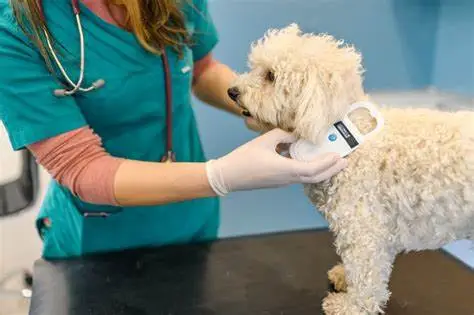
Dog Health and Veterinary Care Laws
Unlike some states with codified regulations, Wyoming’s approach to dog health and veterinary care focuses on broader principles:
- Limited State-Wide Laws: Wyoming lacks a single, state-wide law mandating specific protocols for dog health or veterinary care.
- Focus on Animal Cruelty Prevention: Existing state statutes concerning animal cruelty (W.S. 6-3-1002) apply to veterinary care as well. This law prohibits actions that could endanger your dog’s health or well-being, including denying them necessary veterinary care.
- Veterinary Licensing: The Wyoming Board of Veterinary Medicine licenses veterinarians practicing in the state. These licenses ensure veterinarians meet specific qualifications and adhere to ethical standards for animal care.
Ensuring Responsible Dog Ownership
Beyond legal mandates, responsible dog ownership encompasses several key practices:
- Vaccinations: Vaccinations are crucial for preventing infectious diseases in dogs. Consult your veterinarian about the recommended vaccination schedule for your dog based on their age, lifestyle, and risk factors.
- Parasite Prevention: Internal and external parasites can pose significant health risks to dogs. Regular parasite prevention medication prescribed by your veterinarian helps safeguard your dog’s health.
- Spaying or Neutering: Spaying and neutering your dog offers numerous benefits, including reducing the risk of certain cancers, behavioral problems, and unwanted litters.
- Regular Veterinary Checkups: Schedule regular veterinary checkups for your dog, even if they seem healthy. These checkups allow for early detection of potential health issues and preventive measures.
Finding a Reputable Veterinaria
Here’s how to find a qualified veterinarian for your dog in Wyoming:
- Ask for Recommendations: Talk to friends, family, or fellow dog owners for recommendations on reputable veterinarians in your area.
- Online Resources: Utilize online resources like the American Veterinary Medical Association (AVMA) directory to find veterinarians near you ([invalid URL removed]).
- Veterinary College Resources: The University of Wyoming College of Agriculture and Natural Resources ([invalid URL removed]) might offer resources or maintain a referral list.
Rabies Vaccinations and Regulations
Rabies is a deadly virus transmitted through saliva, primarily through bites from infected animals. Here’s what you need to know about rabies vaccinations in Wyoming:
- Rabies Vaccination Requirements: Wyoming law mandates rabies vaccinations for all dogs three months of age or older (W.S. 33-26-103). Proof of vaccination is often required for dog licensing and may be requested by boarding facilities or doggy daycare centers.
- Rabies Tag: Upon vaccination, your dog will receive a rabies tag to be attached to their collar as proof of vaccination.
Financial Considerations for Veterinary Care
Veterinary care can be expensive, and it’s essential to be prepared:
- Pet Insurance: Consider pet insurance to help cover the costs of unexpected veterinary emergencies or illnesses.
- Veterinarian Payment Options: Ask about payment options offered by veterinary clinics, such as payment plans or financing options.
- Veterinary Discount Programs: Some veterinary clinics offer discount programs for low-income pet owners or senior citizens.
Additional Considerations
Here are some additional factors to keep in mind regarding dog health in Wyoming:
- Wildlife Encounters: Be aware of potential wildlife encounters, particularly with animals like coyotes or snakes, which can pose a threat to your dog’s health.
- Heatstroke: During Wyoming’s hot summers, take precautions to prevent heatstroke in your dog. Avoid strenuous exercise during peak heat hours, provide ample shade and water access, and never leave your dog unattended in a hot car.
Dog Identification and Microchipping Laws in Wyoming
Wyoming, with its vast landscapes and open spaces, is a paradise for outdoor enthusiasts and their canine companions. But adventures can take unexpected turns. Ensuring your dog is properly identified is crucial for a happy reunion if they ever get lost.

Dog Identification and Microchipping Laws
Unlike some states with mandatory microchipping requirements, Wyoming’s approach to dog identification is multifaceted:
- Limited State-Wide Laws: Wyoming doesn’t have a single, state-wide law mandating specific identification methods for dogs.
- Focus on Rabies Vaccination: Wyoming law requires all dogs three months of age or older to be vaccinated against rabies (W.S. 33-26-103). Proof of vaccination often serves as a form of identification, with a rabies tag attached to the dog’s collar.
- Municipal Ordinances: Many cities and towns in Wyoming have ordinances requiring dog licensing. Licensing typically involves registering your dog with the municipality and receiving a license tag, which serves as a form of identification.
The Importance of Dog Identification
While rabies vaccinations and licensing provide some level of identification, microchipping offers a more permanent and reliable solution:
- Microchipping: A microchip is a tiny electronic device implanted between your dog’s shoulder blades. This chip contains a unique identification number that can be read by a scanner at veterinary clinics or animal shelters.
- Lifetime Identification: Microchips are permanent and don’t require replacement like collars or tags, which can get lost or fall off.
- Increased Recovery Rates: Lost dogs with microchips are significantly more likely to be reunited with their owners compared to those without.
The Microchipping Process
Microchipping is a simple and safe procedure:
- Veterinary Clinics: Most veterinary clinics in Wyoming offer microchipping services. The process typically involves a quick injection between the shoulder blades, similar to a vaccination.
- Microchip Registration: When your dog is microchipped, ensure you register the chip with a national pet recovery database. This database links the chip number to your contact information, allowing shelters and veterinary clinics to easily identify you as the owner if your dog is found.
Additional Identification Tips
While microchipping is highly recommended, consider these additional identification methods:
- Collar and Tags: Always equip your dog with a well-fitting collar and identification tags. The tags should include your name, phone number, and your dog’s rabies vaccination tag.
- Engraved Tags: Consider engraved tags with your dog’s name and your contact information for a more permanent solution compared to printed tags.
- Photos and Up-to-Date Information: Keep updated photos of your dog on hand and ensure your contact information is current in any microchip registration databases.
Benefits of Proper Dog Identification
Investing in proper dog identification offers significant advantages:
- Peace of Mind: Knowing your dog is microchipped and has identification tags provides peace of mind during walks, adventures, or travel.
- Increased Recovery Rates: Lost dogs with microchips and identification tags are significantly more likely to be reunited with their owners.
- Reduced Shelter Intake: Prompt reunions with owners reduce the number of dogs entering shelters, freeing up resources for animals in need.
Resources f
Here are some resources to help you get your dog microchipped and registered in Wyoming:
- American Veterinary Medical Association (AVMA): The AVMA website offers information on microchipping and pet recovery.
- Ask Your Veterinarian: Most veterinarians in Wyoming offer microchipping services and can guide you through the registration process.
- National Pet Recovery Database Companies: Several national pet recovery database companies offer microchip registration services. Research their options to find one that suits your needs.
Dog Breeding and Genetics Laws in Wyoming
Wyoming, with its wide-open spaces and diverse landscapes, might seem like a natural breeding ground for canine companions. However, for those considering entering the world of dog breeding, understanding the legal framework in Wyoming is crucial.

Dog Breeding and Genetics Laws
Unlike some states with more codified regulations, Wyoming’s approach to dog breeding is multifaceted:
- Limited State-Wide Laws: Wyoming doesn’t have a single, state-wide law specifically governing dog breeding practices or genetics.
- Focus on Animal Welfare: Existing state statutes concerning animal cruelty (W.S. 6-3-1002) apply to breeders as well. This law prohibits actions that could compromise the health and well-being of breeding dogs.
- Municipal Ordinances: Some cities and towns in Wyoming might have ordinances addressing animal control, potentially including regulations for commercial kennels or breeders.
- Kennel Licensing: While not mandated statewide, some Wyoming counties might require breeders to obtain licenses to operate legally. These licenses often come with minimum standards for kennel facilities and animal care.
Key Considerations for Responsible Dog Breeding
Ethical dog breeding goes beyond simply producing puppies. Here are some factors to consider in Wyoming:
- Breeder Reputation: Research the breeder’s reputation and ensure they prioritize responsible breeding practices, such as:
- Genetic Health Testing: Reputable breeders conduct genetic health testing on breeding stock to screen for hereditary diseases prevalent in specific breeds.
- Proper Breeding Practices: Responsible breeders avoid breeding dogs with known health issues and prioritize temperament evaluation.
- Puppy Care and Socialization: Puppies from reputable breeders receive proper socialization and early developmental experiences to become well-adjusted dogs.
- Kennel Conditions: If required in your area, obtain a kennel license and ensure your facilities meet minimum standards for animal care, hygiene, and space for breeding dogs.
- Selling Practices: Be transparent about your breeding practices, provide accurate information about the puppies’ pedigree and health history, and avoid deceptive advertising.
Finding Information on Dog Breeding Regulations
Since regulations are managed locally, here’s how to find the specifics in your area:
- Contact Your Local Animal Control Agency: They are the most reliable source for information on kennel licensing requirements, any local ordinances impacting dog breeding, and potential limitations on breeding certain breeds.
- Check Municipal or County Websites: Many municipalities and counties in Wyoming have websites outlining their ordinances, including sections on animal control regulations that might pertain to dog breeding.
Ethical Considerations in Dog Breeding
Beyond legal requirements, responsible dog breeding involves ethical considerations:
- Breeding for Improvement: Breed selectively to improve the overall health and temperament of the breed, not solely for profit.
- Overbreeding: Avoid contributing to pet overpopulation by breeding only when there’s a demand for healthy, well-bred puppies.
- Welfare of Breeding Dogs: Prioritize the health and well-being of breeding dogs. Provide them with proper veterinary care, nutritious food, and adequate exercise.
- Finding Homes for Puppies: Reputable breeders screen potential puppy buyers to ensure responsible pet ownership and suitable living environments for the puppies.
Benefits of Responsible Dog Breeding Practices
Responsible dog breeding offers numerous advantages:
- Preserving Breeds: Responsible breeding helps maintain breed standards and preserve desirable traits in purebred dogs.
- Healthy Puppies: Careful breeding practices with health testing contribute to the well-being of puppies, reducing the risk of inheritable diseases.
- Matching Breeds with Owners: Ethical breeders strive to match specific breeds with suitable owners based on lifestyle and needs, promoting successful long-term relationships.
Alternatives to Dog Breeding
If breeding isn’t your calling, there are fulfilling ways to contribute to the canine community:
- Adopting a Dog: Consider adopting a dog from a shelter or rescue organization. Many wonderful dogs of various breeds and ages are waiting for loving homes.
- Volunteering with Rescue Organizations: Volunteer your time and skills to help animal shelters or rescue organizations that care for homeless dogs.
- Promoting Responsible Pet Ownership: Educate others on the importance of responsible pet ownership, spaying or neutering their pets, and adopting from shelters.
Dog Environmental Impact Laws in Wyoming
Wyoming, with its breathtaking landscapes and abundant wildlife, beckons outdoor enthusiasts and their canine companions. But venturing out with your furry friend requires responsible practices to minimize their environmental impact.

Dog Environmental Impact Laws
Unlike some states with specific regulations on dog waste disposal or leash laws in sensitive areas, Wyoming’s approach to dog environmental impact is more nuanced:
- Limited State-Wide Laws: Wyoming doesn’t have a single, state-wide law directly addressing dog environmental impact.
- Focus on Responsible Pet Ownership: Existing animal cruelty laws (W.S. 6-3-1002) emphasize responsible pet ownership, which indirectly promotes practices minimizing environmental impact.
- Municipal Ordinances: Many cities and towns in Wyoming have ordinances addressing animal control, potentially including regulations on leash laws in public spaces and waste disposal requirements.
- State Park Regulations: Wyoming State Parks have their own set of regulations regarding dogs in parks. These often mandate leash requirements on trails and may restrict dogs in certain sensitive areas.
Minimizing Dog Waste Impact
Dog waste, if not disposed of properly, can contribute to environmental pollution. Here’s how to be a responsible dog owner in Wyoming:
- Always Carry Waste Bags: Make carrying and using biodegradable waste bags a regular habit during walks or outdoor adventures.
- Dispose of Waste Properly: Never leave waste bags behind. Dispose of them in designated waste bins or pack them out with you to be disposed of properly later.
- Respect Park Regulations: Be mindful of any specific regulations regarding waste disposal in parks or public spaces you visit.
Finding Information on Leash Laws and Dog Restrictions
Since regulations are managed locally, here’s how to find the specifics in your area:
- Contact Your Local Animal Control Agency: They’re the most reliable source for information on leash laws in public spaces, waste disposal regulations, and any restrictions on dog access in specific areas.
- Check Municipal or County Websites: Many municipalities and counties in Wyoming have websites outlining their ordinances, including sections on animal control regulations and leash laws in public spaces.
- State Parks Website: The Wyoming State Parks website provides information on dog regulations within specific parks, including leash requirements and areas where dogs might be restricted.
Responsible Dog Behavior in Natural Areas
Leash laws are one aspect of responsible dog ownership in natural areas:
- Voice Control: Even in off-leash areas, ensure you have good voice control over your dog to minimize disruption to wildlife or other park users.
- Stay on Designated Trails: Stick to designated trails to minimize your dog’s impact on vegetation and wildlife habitat.
- Respect Wildlife: Keep your dog leashed in areas with known wildlife activity to prevent encounters that could harm your dog or wildlife.
- Minimize Barking: Address excessive barking, especially in areas frequented by wildlife or where noise might disturb other park users.
Leave No Trace Principles for Dog Owners
Leave No Trace principles emphasize minimizing human impact on the outdoors. Here’s how to adapt them for dog ownership:
- Plan Your Trip: Research dog regulations in the area you’re visiting and pack enough waste bags for your outing.
- Dispose of Waste Properly: As mentioned previously, responsible waste disposal is crucial.
- Respect Wildlife: Keep your dog leashed in areas with wildlife activity and avoid disturbing wildlife habitat.
- Minimize Barking: Address excessive barking to ensure a peaceful environment for everyone.
- Leave No Trace: Pack out all dog waste and any other trash you or your dog might generate.
Benefits of Responsible Dog Ownership
Responsible dog ownership benefits both your furry friend and the environment:
- Reduced Environmental Impact: Minimizing waste left behind and respecting wildlife habitats helps preserve the beauty of Wyoming’s natural areas.
- Safer Outdoor Adventures: Keeping your dog leashed in certain areas reduces the risk of encounters with wildlife or other park users.
- Positive Dog Experiences: Well-behaved dogs are more likely to be welcomed in dog-friendly areas, allowing for enjoyable outdoor adventures together.
Dog Behavioural Training Laws in Wyoming
Wyoming, with its vast landscapes and open spaces, beckons dog owners and their furry companions for adventure. But a well-behaved canine is essential for a harmonious relationship and enjoyable outings.

Dog Behavioural Training Laws
Unlike some states with regulations governing dog trainer licensing or training methods, Wyoming’s approach focuses on broader principles:
- Limited State-Wide Laws: Wyoming lacks a single, state-wide law mandating specific dog behavioural training protocols or trainer licensing requirements.
- Focus on Responsible Pet Ownership: Existing animal cruelty laws (W.S. 6-3-1002) apply to training methods as well. This law prohibits practices causing undue pain, suffering, or distress to your dog.
- Municipal Ordinances: Some cities and towns in Wyoming might have ordinances addressing public safety or nuisance barking, potentially impacting training approaches for these specific issues.
Promoting Positive Reinforcement Training Techniques
While there are no mandated training methods, positive reinforcement is widely recommended:
- Reward-Based Training: Positive reinforcement training focuses on rewarding desired behaviours, fostering a positive association with learning. This method is considered humane, effective, and strengthens the bond between you and your dog.
- Focus on Building Trust: Positive reinforcement builds trust and cooperation, leading to a more enjoyable training experience for both you and your dog.
- Seeking Professional Help: Consider consulting a certified professional dog trainer (PDT) for guidance on addressing specific behavioural challenges or learning the best techniques for your dog.
Finding a Qualified Dog Trainer
Here are some resources to help you find a qualified dog trainer in Wyoming:
- The Certification Council for Professional Dog Trainers (CCPDT): The CCPDT website allows you to search for certified trainers in your area.
- Ask for Recommendations: Talk to friends, family, or fellow dog owners for recommendations on reputable dog trainers in your area.
- Online Resources: Utilize online resources like the American Kennel Club (AKC) directory of trainers to find trainers near you.
Responsible Dog Ownership
Training goes beyond legal requirements and involves proactive behaviour management:
- Socialization: Socialize your dog from a young age to ensure they are comfortable interacting with other dogs, people, and new environments.
- Preventative Measures: Manage your dog’s environment to minimize situations that might trigger unwanted behaviours like barking or chewing.
- Consistency is Key: Be consistent with your training commands and expectations. Dogs thrive on routine and predictability.
- Addressing Behavioural Challenges: Seek professional help if your dog exhibits behavioural challenges like aggression, fearfulness, or excessive barking.
Benefits of Positive Reinforcement Dog Training
Training your dog using positive reinforcement offers numerous advantages:
- Stronger Bond: Positive reinforcement strengthens the bond between you and your dog, fostering trust and mutual respect.
- Well-Mannered Dog: A well-trained dog is a joy to live with and is more likely to be welcomed in public spaces or on adventures with you.
- Reduced Behavioural Issues: Positive reinforcement training helps address and prevent common behavioural problems like barking, chewing, or leash pulling.
- Lifelong Learning: Positive reinforcement techniques encourage a positive association with learning, promoting a lifelong love of training for your dog.
Additional Considerations
Here are some additional factors to consider fostering responsible dog ownership in Wyoming:
- Leash Laws and Public Safety: Be mindful of leash laws in your area and ensure your dog is under control in public spaces.
- Respecting Wildlife: If you encounter wildlife while exploring Wyoming’s outdoors, keep your dog leashed and under control to avoid encounters that could threaten your dog or wildlife.
- Picking Up After Your Dog: Always pick up and dispose of your dog’s waste properly. This keeps public spaces clean and protects the environment.
Dog Protection and Rescue Laws in Wyoming
Wyoming, with its majestic mountains and sprawling plains, beckons dog owners and animal lovers alike. But ensuring the safety and well-being of our furry friends requires understanding the legal framework in place.

Dog Protection and Rescue Laws
Unlike some states with codified regulations governing animal shelters or specific rescue protocols, Wyoming’s approach to dog protection and rescue is multifaceted:
- Limited State-Wide Laws: Wyoming lacks a single, state-wide law mandating specific protocols for animal shelters or rescue operations.
- Focus on Animal Cruelty Prevention: Existing animal cruelty statutes (W.S. 6-3-1002) are the foundation for dog protection. These laws prohibit actions that could endanger a dog’s health or well-being, including neglect, abandonment, or intentional cruelty.
- Municipal Ordinances: Many cities and towns in Wyoming have ordinances addressing animal control, potentially including regulations for animal shelters or impounding stray dogs. These ordinances may vary by location.
Key Elements of Dog Protection
Several important considerations contribute to dog protection in Wyoming:
- Responsible Pet Ownership: The cornerstone of dog protection is responsible ownership. This includes providing proper food, water, shelter, veterinary care, and socialization for your dog.
- Microchipping and Identification: Microchipping your dog and ensuring they wear a collar with identification tags increases the chances of a lost dog being reunited with their owner.
- Reporting Animal Cruelty: If you suspect animal cruelty, it’s crucial to report it to the appropriate authorities, such as animal control or law enforcement.
The Role of Animal Shelters and Rescue Organizations
Animal shelters and rescue organizations play a vital role in protecting dogs in Wyoming:
- Sheltering Lost or Abandoned Animals: Shelters provide temporary housing and care for lost or abandoned dogs.
- Adoption Opportunities: Animal shelters and rescues work to find loving forever homes for homeless dogs.
- Community Education: Many shelters and rescues offer educational programs to promote responsible pet ownership and spaying or neutering pets to reduce pet overpopulation.
Finding Animal Shelters and Rescue Organizations
Here are some resources to help you find animal shelters and rescue organizations in Wyoming:
- The National Shelter Directory: This online resource allows you to search for shelters and rescues by location.
- Wyoming Humane Society: The Wyoming Humane Society is a statewide organization that advocates for animal welfare and might have resources to connect you with local shelters or rescues.
- Ask Your Veterinarian: Your veterinarian might be aware of reputable shelters and rescue organizations in your area.
How You Can Contribute to Dog Rescue Efforts
Beyond adopting a dog, there are many ways to contribute to dog rescue efforts:
- Volunteering: Shelters and rescues often rely on volunteers to help with dog walking, socialization, cleaning, and other essential tasks.
- Donations: Monetary donations or donations of pet food, toys, and cleaning supplies can significantly benefit shelters and rescues.
- Fostering: Fostering a dog in your home provides temporary care and socialization while they wait for their forever home.
Additional Considerations
Here are some additional factors to keep in mind regarding dog protection in Wyoming:
- Tethering Laws: While there aren’t state-wide tethering laws, some municipalities might have ordinances regulating tethering practices.
- Hot Weather Safety: During Wyoming’s hot summers, ensure your dog has access to shade, plenty of water, and avoid strenuous activity during peak heat hours.
- Wildlife Encounters: Be aware of potential wildlife encounters, particularly with animals like coyotes or snakes, which can pose a threat to your dog’s health.
Spaying and Neutering
Spaying and neutering your dog is a crucial aspect of responsible pet ownership and dog protection:
- Reduced Risk of Certain Cancers: Spaying and neutering helps reduce the risk of certain cancers in dogs.
- Preventing Unwanted Litters: Spaying and neutering helps control pet overpopulation, reducing the number of dogs ending up in shelters.
- Behavioral Benefits: Spaying and neutering can sometimes improve a dog’s behavior by reducing roaming tendencies and aggression.
Dog Entertainment and Work Laws in Wyoming
Wyoming, with its vast landscapes and adventurous spirit, beckons humans and their canine companions alike. Whether exploring hiking trails or participating in outdoor activities, dogs can be valuable partners in work and entertainment. But ensuring their well-being and legal compliance requires understanding Wyoming’s framework for dog involvement in these areas.

Dog Entertainment and Work Laws
Unlike some states with codified regulations governing animal performances or specific guidelines for working dogs, Wyoming’s approach focuses on broader principles:
- Limited State-Wide Laws: Wyoming lacks a single, state-wide law mandating specific protocols for dog entertainment or outlining regulations for working dogs.
- Focus on Animal Cruelty Prevention: Existing animal cruelty statutes (W.S. 6-3-1002) are the foundation for ensuring ethical treatment. These laws prohibit actions that could endanger a dog’s health or well-being in any setting, including entertainment or work.
- Municipal Ordinances: Some cities and towns in Wyoming might have ordinances addressing animal control, potentially including regulations for animal performances or restrictions on certain types of working dogs. These ordinances might vary by location.
Prioritizing Dog Welfare
Whether your dog is a hiking companion or a farmhand in training, their well-being is paramount:
- Breed and Temperament: Choose activities suitable for your dog’s breed, size, and temperament. Not all dogs enjoy high-energy activities or crowded environments.
- Proper Training and Conditioning: Ensure your dog is appropriately trained for the intended activity and physically conditioned to handle the demands.
- Safety Considerations: Prioritize safety measures, such as proper gear, breaks to avoid overexertion, and access to water to prevent dehydration, especially during hot weather.
Exploring Dog Entertainment Opportunities
Wyoming offers numerous dog-friendly entertainment possibilities:
- Hiking and Camping: Many trails and campsites welcome well-behaved, leashed dogs. Research regulations and etiquette beforehand.
- Dog Parks: Designated dog parks offer opportunities for socialization and playtime with other canine companions.
- Dog-Friendly Events: Some Wyoming communities host dog-friendly events, like agility courses or obedience competitions.
Considerations for Dog Entertainment Activities
Here are some additional factors to consider for dog-friendly entertainment:
- Weather Conditions: Avoid strenuous activities during extreme heat or cold. Adjust activity level based on temperature.
- Wildlife Encounters: Be aware of potential wildlife encounters, particularly with animals like coyotes or snakes, which can pose a threat to your dog.
- Respecting Others: Maintain control of your dog and ensure they don’t disturb other park users or wildlife.
Regulations for Working Dogs
While there are no state-wide regulations for working dogs, here’s what to consider:
- Specific Working Dog Breeds: Certain dog breeds, like sheepdogs or herding dogs, excel at specific working tasks.
- Training and Certification: While not always mandated, specialized training and certification can enhance your dog’s effectiveness and safety in working roles.
- Municipal Ordinances: Some municipalities might have specific ordinances related to working dogs, such as licensing requirements for livestock guardian dogs.
Benefits of Utilizing Working Dogs
Working dogs provide valuable services in various areas:
- Livestock Management: Herding dogs assist ranchers in managing livestock, contributing to efficient farming practices.
- Search and Rescue: Search and rescue dogs play a crucial role in locating missing persons in Wyoming’s vast landscapes.
- Detection and Assistance: Dogs trained for specific tasks like detection dogs or service animals can be invaluable assets in various fields.
Responsible Ownership
Whether your dog is your entertainment partner or a working companion, responsible ownership is crucial:
- Veterinary Care: Ensure your dog receives regular veterinary checkups and preventive care to maintain optimal health.
- Licensing and Registration: Check with your local authorities regarding any licensing or registration requirements for working dogs in your area.
- Respecting Regulations: Be mindful of any municipal ordinances governing animal performances or working dog activities in your area.
Dog Technology and Innovation Laws in Wyoming
Wyoming, with its wide-open spaces and adventurous spirit, is a haven for outdoor enthusiasts and their canine companions. Technology is constantly evolving, and innovative products are emerging to enhance the lives of both humans and their furry friends.
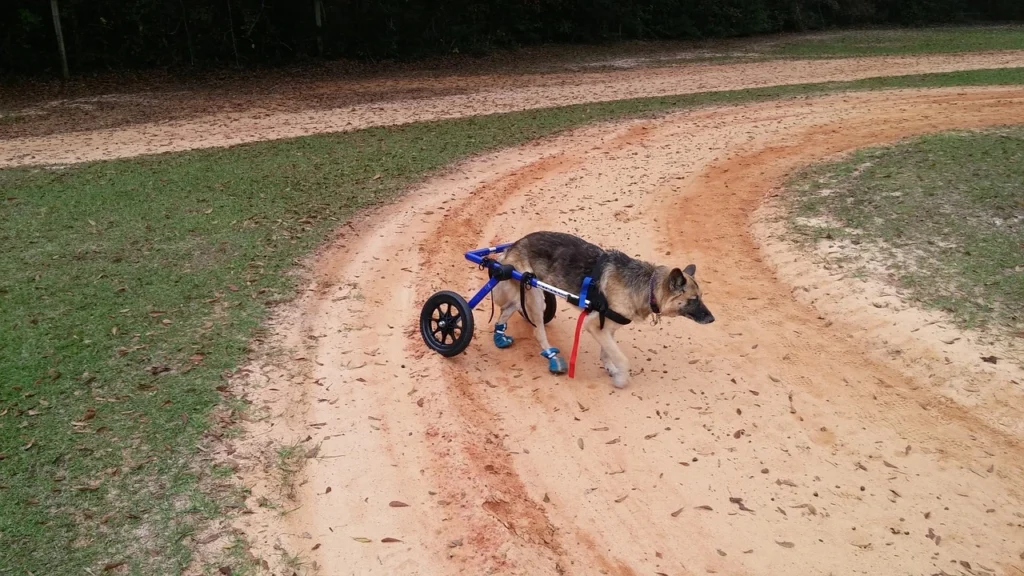
Dog Technology and Innovation Laws
Unlike some states with specific regulations governing the use of pet tech products, Wyoming’s approach is more nuanced:
- Limited State-Wide Laws: Wyoming lacks a single, state-wide law directly addressing or regulating the use of pet technology or innovations in dog health technology.
- Focus on Animal Welfare: Existing animal cruelty statutes (W.S. 6-3-1002) remain the foundation. These laws prohibit actions that could endanger a dog’s health or well-being through the use of any device or technology.
- Federal Regulations: The U.S. Food and Drug Administration (FDA) plays a significant role in regulating animal drugs and medical devices. Products marketed with health claims must undergo FDA approval to ensure safety and effectiveness.
Exploring the World of Dog Technology
The pet tech industry is rapidly evolving, offering a variety of innovative products:
- Wearable Trackers: These devices attach to your dog’s collar and track activity levels, sleep patterns, and even location in some cases.
- Smart Feeders and Water Dispensers: These connected devices allow you to monitor and control your dog’s food and water intake remotely.
- Remote Training Devices: Some products use electronic stimulation or sound to train dogs, but their use is often controversial.
- Telemedicine for Pets: Emerging technologies allow for remote consultations with veterinarians for non-emergency situations.
Important Considerations
While pet tech offers exciting possibilities, responsible use is essential:
- Prioritize Dog Welfare: The technology should enhance your dog’s well-being, not compromise it. Avoid products that cause discomfort or pain.
- Veterinarian Consultation: Discuss using any technology with your veterinarian, especially products with health claims or remote training devices.
- Data Security: Be mindful of data privacy and choose products with robust security measures to protect your dog’s information.
- Focus on Training and Bonding: Technology should supplement traditional training methods, not replace them. Prioritize positive reinforcement and building a strong bond with your dog.
The Role of the FDA in Regulating Pet Technology
The FDA plays a crucial role in ensuring the safety and effectiveness of pet tech products:
- Classification: The FDA classifies pet tech products based on their intended use and potential risks. Class I products are considered low-risk, while Class III products require more stringent pre-market approval.
- Consumer Safety: The FDA issues warnings or recalls for pet tech products that pose potential safety hazards to animals.
Approved Pet Tech Products
Here are some resources to help you find information on FDA-approved pet tech products:
- FDA Animal Drugs and Medical Devices Website: This website allows you to search for approved animal drugs and medical devices by product name or type.
- Consult with your Veterinarian: Your veterinarian can advise you on safe and effective pet tech options for your dog’s specific needs.
The Future of Dog Technology and Innovation
The future of dog technology holds exciting possibilities:
- Advanced Health Monitoring: Wearable devices and sensors might provide real-time health data, aiding in early disease detection and personalized care.
- Remote Training Advancements: Positive reinforcement-based remote training methods could become more sophisticated and widely available.
- Artificial Intelligence (AI) Applications: AI technology might offer personalized insights into dog behavior and needs.
Responsible Innovation
As dog technology advances, responsible innovation that prioritizes animal welfare is paramount:
- Ethical Development: Development of pet tech products should prioritize safety, comfort, and overall well-being of dogs.
- Veterinarian Involvement: Veterinarians should be actively involved in the development and testing of pet tech products to ensure their efficacy and safety.
Human Coexistence Laws in Wyoming
Wyoming, with its breathtaking landscapes and adventurous spirit, is a natural draw for dog lovers. But fostering a harmonious relationship goes beyond simply sharing a home.

Human Coexistence Laws
Unlike some states with specific legislation mandating dog socialization or training requirements, Wyoming’s approach focuses on broader principles:
- Limited State-Wide Laws: Wyoming lacks a single, state-wide law directly promoting human-canine cohabitation or bonding.
- Focus on Animal Cruelty Prevention: Existing animal cruelty statutes (W.S. 6-3-1002) apply here. These laws prioritize basic needs and prevent neglect, abuse, or practices that could hinder a healthy human-dog relationship.
- Municipal Ordinances: Many cities and towns in Wyoming have ordinances addressing animal control, potentially including regulations on leash laws in public spaces. These ordinances might indirectly influence opportunities for dog socialization and human-canine interaction.
Enhancing Human-Canine Coexistence
Laws provide a framework, but responsible ownership fosters a thriving human-canine bond:
- Socialization From a Young Age: Socialize your dog from puppyhood to ensure they feel comfortable interacting with other dogs, people, and new environments. This socialization lays the groundwork for a well-adjusted dog who can participate in activities with you.
- Positive Reinforcement Training: Positive reinforcement training strengthens your bond with your dog by fostering trust and mutual respect. Reward desired behaviors, making training a positive experience for both of you.
- Meeting Your Dog’s Needs: Provide proper food, water, shelter, veterinary care, exercise, and mental stimulation. A fulfilled dog is more likely to form a strong bond with their human companion.
Finding Dog-Friendly Activities
Wyoming offers numerous opportunities to strengthen the human-canine bond through shared experiences:
- Hiking and Camping: Many dog-friendly trails and campsites allow you to explore the outdoors together. Research regulations and practice responsible dog etiquette beforehand.
- Dog Parks: Designated dog parks provide opportunities for socialization and playtime with other canine companions.
- Dog-Friendly Events: Some Wyoming communities host dog-friendly events, like agility courses or obedience competitions, fostering positive interactions and teamwork.
Building a Strong Bond
Laws can’t create a bond, but responsible ownership strengthens it:
- Understanding Dog Behavior: Learn about canine communication and body language to better understand your dog’s needs and feelings.
- Quality Time Together: Dedicate time for activities you both enjoy, whether it’s cuddling on the couch or going for an invigorating hike.
- Positive Reinforcement: Reward good behavior and desired interactions to solidify positive associations and strengthen your connection.
Additional Considerations
Here are some additional factors to consider fostering a strong human-canine bond:
- Respecting Others: Maintain control of your dog in public spaces, ensuring their behavior doesn’t disrupt other park users or wildlife.
- Responsible Leash Laws: Be mindful of leash laws in your area and ensure your dog is leashed where required.
- Cleaning Up After Your Dog: Always pick up and dispose of your dog’s waste properly. This keeps public spaces clean and promotes a positive experience for everyone.
Benefits of a Strong Human-Canine Bond
A strong human-canine bond offers numerous benefits for both parties:
- Improved Well-being: Studies suggest owning a dog can reduce stress, increase physical activity, and provide companionship, leading to improved well-being for both humans and dogs.
- Enhanced Training and Communication: A strong bond facilitates training and improves communication between you and your dog.
- A Fulfilling Partnership: A strong human-canine bond allows for shared adventures, companionship, and a sense of mutual respect and trust.
Other Relevant Dog Laws in Wyoming
Canine Good Citizen (CGC) Programs and Legal Benefits
- CGC Programs: While not mandated by law, the American Kennel Club (AKC) offers Canine Good Citizen (CGC) programs. These programs provide training for basic obedience and responsible dog ownership.
- Potential Benefits: Completing a CGC program might demonstrate responsible ownership and could potentially benefit your dog in certain situations, such as qualifying for discounts on dog daycare or boarding services (depending on the provider’s policy).
Dog Insurance and Coverage Laws
- Regulation: Dog insurance is not mandated by Wyoming law.
- Coverage Options: Pet insurance companies offer various coverage plans, typically reimbursing veterinary costs associated with accidents or illnesses.
- Considerations: Research different plans and choose coverage that aligns with your dog’s breed, age, and potential health needs.
Laws Regarding Dogs in Hot Cars and Animal Endangerment
- Animal Cruelty Statutes: Existing Wyoming animal cruelty statutes (W.S. 6-3-1002) apply here. Leaving a dog in a hot car can be considered animal cruelty if it causes undue suffering.
- Recommendations: Never leave your dog unattended in a hot car, even for short periods. The temperature inside a parked car can rise rapidly, posing a serious health threat to your dog.
Legal Aspects of Dog Parks and Shared Spaces
- Municipal Ordinances: Many Wyoming cities and towns have ordinances governing dog parks, including leash laws, access requirements, and waste disposal regulations. Always research and adhere to the specific rules of the dog park you visit.
- Responsible Ownership: Maintain control of your dog in shared spaces, ensuring their behavior doesn’t disrupt other park users or pose a threat to other dogs.
Dog-Related Property Damage and Homeowner’s Insurance
- Homeowner’s Insurance: Most homeowner’s insurance policies cover dog-related property damage to your own property, with limitations and exclusions possible. However, coverage for damage caused by your dog to someone else’s property might be limited or require additional liability coverage.
- Responsible Ownership: Proper training and socialization can help minimize the risk of your dog causing property damage.
Service and Working Dog Laws in Employment and Public Access
- Federal Laws: The Americans with Disabilities Act (ADA) protects the rights of individuals with disabilities to be accompanied by qualified service animals in public spaces and some workplaces.
- Wyoming Laws: Wyoming follows the federal guidelines established by the ADA regarding service animals. Emotional support animals (ESAs) are not covered under the ADA but might be allowed in housing situations based on specific landlord policies.
Animal Welfare and Protection Laws Against Neglect and Abandonment
- Animal Cruelty Statutes: Wyoming’s animal cruelty statutes (W.S. 6-3-1002) prohibit neglect, abandonment, or any action that could cause undue suffering to an animal.
- Reporting Requirements: If you suspect animal cruelty, it’s crucial to report it to the appropriate authorities, such as animal control or law enforcement.
Wyoming offers a haven for dog lovers, but navigating the legal landscape can be complex. This guide explored dog-related laws in Wyoming, highlighting the importance of responsible ownership. While state-wide regulations are limited, adhering to existing animal cruelty statutes and any municipal ordinances ensures your dog’s well-being and protects the community.
Following dog training and socialization best practices strengthens the human-canine bond and promotes positive interactions in shared spaces. Understanding dog tech and innovation requires prioritizing animal welfare and utilizing FDA-approved products. Ultimately, compliance with dog laws isn’t just about legal obligations; it’s about creating a fulfilling life for your furry friend and fostering a harmonious relationship between dogs and humans in Wyoming.
FAQs
Are there any breed restrictions in Wyoming?
Wyoming doesn’t have a statewide ban on specific dog breeds. However, some municipalities might have ordinances restricting certain breeds considered potentially dangerous. It’s crucial to check with your local animal control or municipality to understand any breed restrictions in your area.
What are the vaccination requirements for dogs in Wyoming?
Wyoming requires all dogs over four months old to be vaccinated against rabies. Some municipalities might have additional vaccination requirements, so it’s best to check with your veterinarian or local animal control for the latest information.
Do I need to license my dog in Wyoming?
Most Wyoming counties require dog licensing. Licenses typically need to be renewed annually. Licensing fees can vary by location. Contact your local animal control office to understand licensing requirements and fees in your area.
Can I take my dog off-leash anywhere in Wyoming?
Leash laws vary by location in Wyoming. Some public spaces might allow off-leash access in designated areas, while others require dogs to be leashed at all times. Always check signage or inquire with local authorities before letting your dog off-leash.
What are the laws regarding traveling with my dog in Wyoming?
There are no specific state-wide laws regarding traveling with your dog in Wyoming. However, some public spaces or national parks might have restrictions on dog access. It’s advisable to research any specific regulations for places you plan to visit with your dog. Additionally, some airlines or travel providers might have their own pet policies, so check with them beforehand.

